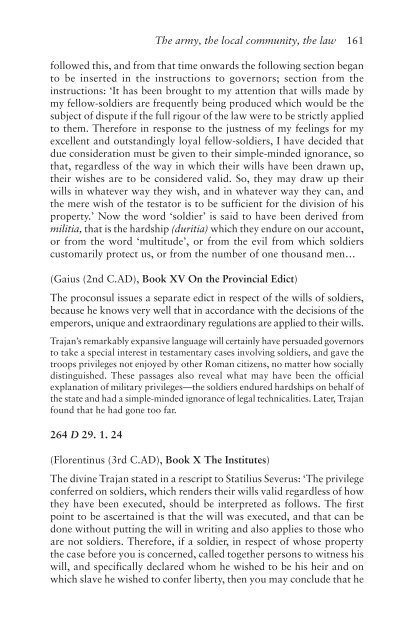The Roman Army, 31 BC–AD 337: A Sourcebook
The Roman Army, 31 BC–AD 337: A Sourcebook
The Roman Army, 31 BC–AD 337: A Sourcebook
You also want an ePaper? Increase the reach of your titles
YUMPU automatically turns print PDFs into web optimized ePapers that Google loves.
<strong>The</strong> army, the local community, the law 161<br />
followed this, and from that time onwards the following section began<br />
to be inserted in the instructions to governors; section from the<br />
instructions: ‘It has been brought to my attention that wills made by<br />
my fellow-soldiers are frequently being produced which would be the<br />
subject of dispute if the full rigour of the law were to be strictly applied<br />
to them. <strong>The</strong>refore in response to the justness of my feelings for my<br />
excellent and outstandingly loyal fellow-soldiers, I have decided that<br />
due consideration must be given to their simple-minded ignorance, so<br />
that, regardless of the way in which their wills have been drawn up,<br />
their wishes are to be considered valid. So, they may draw up their<br />
wills in whatever way they wish, and in whatever way they can, and<br />
the mere wish of the testator is to be sufficient for the division of his<br />
property.’ Now the word ‘soldier’ is said to have been derived from<br />
militia, that is the hardship (duritia) which they endure on our account,<br />
or from the word ‘multitude’, or from the evil from which soldiers<br />
customarily protect us, or from the number of one thousand men…<br />
(Gaius (2nd C.AD), Book XV On the Provincial Edict)<br />
<strong>The</strong> proconsul issues a separate edict in respect of the wills of soldiers,<br />
because he knows very well that in accordance with the decisions of the<br />
emperors, unique and extraordinary regulations are applied to their wills.<br />
Trajan’s remarkably expansive language will certainly have persuaded governors<br />
to take a special interest in testamentary cases involving soldiers, and gave the<br />
troops privileges not enjoyed by other <strong>Roman</strong> citizens, no matter how socially<br />
distinguished. <strong>The</strong>se passages also reveal what may have been the official<br />
explanation of military privileges—the soldiers endured hardships on behalf of<br />
the state and had a simple-minded ignorance of legal technicalities. Later, Trajan<br />
found that he had gone too far.<br />
264 D 29. 1. 24<br />
(Florentinus (3rd C.AD), Book X <strong>The</strong> Institutes)<br />
<strong>The</strong> divine Trajan stated in a rescript to Statilius Severus: ‘<strong>The</strong> privilege<br />
conferred on soldiers, which renders their wills valid regardless of how<br />
they have been executed, should be interpreted as follows. <strong>The</strong> first<br />
point to be ascertained is that the will was executed, and that can be<br />
done without putting the will in writing and also applies to those who<br />
are not soldiers. <strong>The</strong>refore, if a soldier, in respect of whose property<br />
the case before you is concerned, called together persons to witness his<br />
will, and specifically declared whom he wished to be his heir and on<br />
which slave he wished to confer liberty, then you may conclude that he



